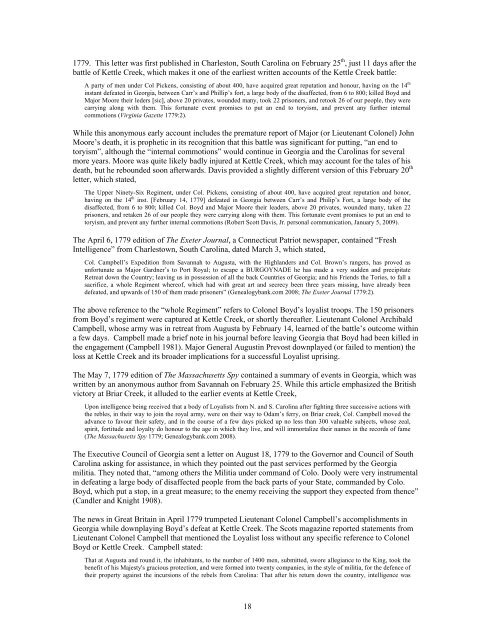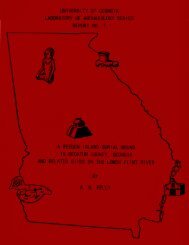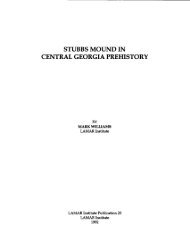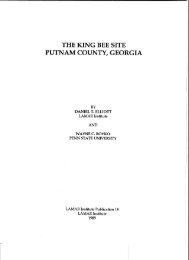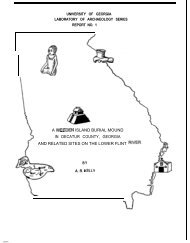Stirring Up a Hornet's Nest: - UGA Laboratory of Archaeology ...
Stirring Up a Hornet's Nest: - UGA Laboratory of Archaeology ...
Stirring Up a Hornet's Nest: - UGA Laboratory of Archaeology ...
Create successful ePaper yourself
Turn your PDF publications into a flip-book with our unique Google optimized e-Paper software.
1779. This letter was first published in Charleston, South Carolina on February 25 th , just 11 days after the<br />
battle <strong>of</strong> Kettle Creek, which makes it one <strong>of</strong> the earliest written accounts <strong>of</strong> the Kettle Creek battle:<br />
A party <strong>of</strong> men under Col Pickens, consisting <strong>of</strong> about 400, have acquired great reputation and honour, having on the 14 th<br />
instant defeated in Georgia, between Carr’s and Phillip’s fort, a large body <strong>of</strong> the disaffected, from 6 to 800; killed Boyd and<br />
Major Moore their leders [sic], above 20 privates, wounded many, took 22 prisoners, and retook 26 <strong>of</strong> our people, they were<br />
carrying along with them. This fortunate event promises to put an end to toryism, and prevent any further internal<br />
commotions (Virginia Gazette 1779:2).<br />
While this anonymous early account includes the premature report <strong>of</strong> Major (or Lieutenant Colonel) John<br />
Moore’s death, it is prophetic in its recognition that this battle was significant for putting, “an end to<br />
toryism”, although the “internal commotions” would continue in Georgia and the Carolinas for several<br />
more years. Moore was quite likely badly injured at Kettle Creek, which may account for the tales <strong>of</strong> his<br />
death, but he rebounded soon afterwards. Davis provided a slightly different version <strong>of</strong> this February 20 th<br />
letter, which stated,<br />
The <strong>Up</strong>per Ninety-Six Regiment, under Col. Pickens, consisting <strong>of</strong> about 400, have acquired great reputation and honor,<br />
having on the 14 th inst. [February 14, 1779] defeated in Georgia between Carr’s and Philip’s Fort, a large body <strong>of</strong> the<br />
disaffected, from 6 to 800; killed Col. Boyd and Major Moore their leaders, above 20 privates, wounded many, taken 22<br />
prisoners, and retaken 26 <strong>of</strong> our people they were carrying along with them. This fortunate event promises to put an end to<br />
toryism, and prevent any further internal commotions (Robert Scott Davis, Jr. personal communication, January 5, 2009).<br />
The April 6, 1779 edition <strong>of</strong> The Exeter Journal, a Connecticut Patriot newspaper, contained “Fresh<br />
Intelligence” from Charlestown, South Carolina, dated March 3, which stated,<br />
Col. Campbell’s Expedition from Savannah to Augusta, with the Highlanders and Col. Brown’s rangers, has proved as<br />
unfortunate as Major Gardner’s to Port Royal; to escape a BURGOYNADE he has made a very sudden and precipitate<br />
Retreat down the Country; leaving us in possession <strong>of</strong> all the back Countries <strong>of</strong> Georgia; and his Friends the Tories, to fall a<br />
sacrifice, a whole Regiment where<strong>of</strong>, which had with great art and secrecy been three years missing, have already been<br />
defeated, and upwards <strong>of</strong> 150 <strong>of</strong> them made prisoners” (Genealogybank.com 2008; The Exeter Journal 1779:2).<br />
The above reference to the “whole Regiment” refers to Colonel Boyd’s loyalist troops. The 150 prisoners<br />
from Boyd’s regiment were captured at Kettle Creek, or shortly thereafter. Lieutenant Colonel Archibald<br />
Campbell, whose army was in retreat from Augusta by February 14, learned <strong>of</strong> the battle’s outcome within<br />
a few days. Campbell made a brief note in his journal before leaving Georgia that Boyd had been killed in<br />
the engagement (Campbell 1981). Major General Augustin Prevost downplayed (or failed to mention) the<br />
loss at Kettle Creek and its broader implications for a successful Loyalist uprising.<br />
The May 7, 1779 edition <strong>of</strong> The Massachusetts Spy contained a summary <strong>of</strong> events in Georgia, which was<br />
written by an anonymous author from Savannah on February 25. While this article emphasized the British<br />
victory at Briar Creek, it alluded to the earlier events at Kettle Creek,<br />
<strong>Up</strong>on intelligence being received that a body <strong>of</strong> Loyalists from N. and S. Carolina after fighting three successive actions with<br />
the rebles, in their way to join the royal army, were on their way to Odam’s ferry, on Briar creek, Col. Campbell moved the<br />
advance to favour their safety, and in the course <strong>of</strong> a few days picked up no less than 300 valuable subjects, whose zeal,<br />
spirit, fortitude and loyalty do honour to the age in which they live, and will immortalize their names in the records <strong>of</strong> fame<br />
(The Massachusetts Spy 1779; Genealogybank.com 2008).<br />
The Executive Council <strong>of</strong> Georgia sent a letter on August 18, 1779 to the Governor and Council <strong>of</strong> South<br />
Carolina asking for assistance, in which they pointed out the past services performed by the Georgia<br />
militia. They noted that, “among others the Militia under command <strong>of</strong> Colo. Dooly were very instrumental<br />
in defeating a large body <strong>of</strong> disaffected people from the back parts <strong>of</strong> your State, commanded by Colo.<br />
Boyd, which put a stop, in a great measure; to the enemy receiving the support they expected from thence”<br />
(Candler and Knight 1908).<br />
The news in Great Britain in April 1779 trumpeted Lieutenant Colonel Campbell’s accomplishments in<br />
Georgia while downplaying Boyd’s defeat at Kettle Creek. The Scots magazine reported statements from<br />
Lieutenant Colonel Campbell that mentioned the Loyalist loss without any specific reference to Colonel<br />
Boyd or Kettle Creek. Campbell stated:<br />
That at Augusta and round it, the inhabitants, to the number <strong>of</strong> 1400 men, submitted, swore allegiance to the King, took the<br />
benefit <strong>of</strong> his Majesty's gracious protection, and were formed into twenty companies, in the style <strong>of</strong> militia, for the defence <strong>of</strong><br />
their property against the incursions <strong>of</strong> the rebels from Carolina: That after his return down the country, intelligence was<br />
18


